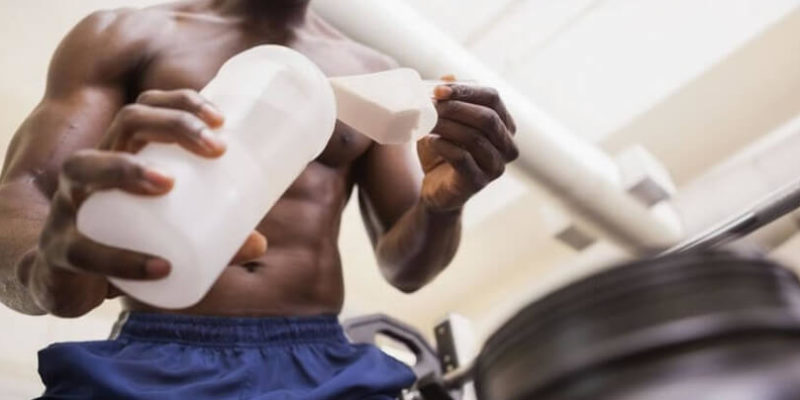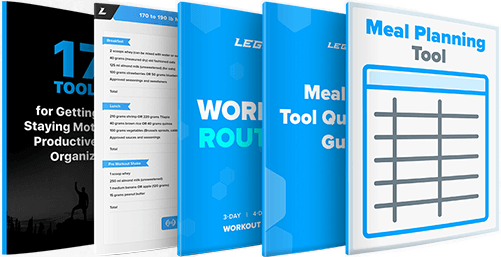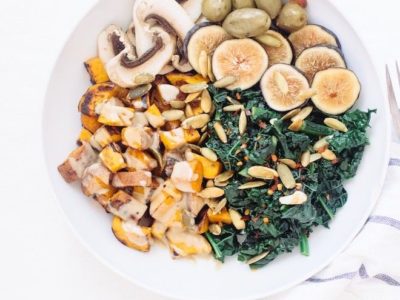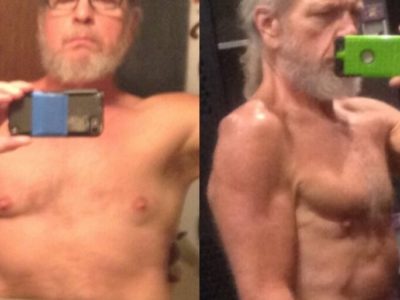
There are so many protein supplements available nowadays that finding the best type of protein powder can feel overwhelming.
Not only are there several types of protein powder to choose from—whey, casein, egg, soy, and so on—but in many cases each type has sub-types, like concentrates, isolates, and hydrolysates.
What’s more, many manufacturers blend different types together, and include additional amino acids, digestive enzymes, and many polysyllabic ingredients that are difficult to pronounce let alone understand.
When confronted with this smorgasbord of options, many people just buy whatever’s cheapest, but they often wind up with subpar protein powder as a result.
The good news is you don’t need an encyclopedic knowledge of protein to make informed decisions about which type of protein powder you buy.
In this article, you’ll learn about the various types of protein powders available, as well as answers to common questions, such as . . .
- What are protein powders?
- Do you need protein powder?
- What are the different types of protein powder?
- What kind of protein powder should I use?
What Are Protein Powders?
Protein powders are high-protein dietary supplements made from a variety of animal and plant foods such as milk, eggs, collagen, rice, peas, and soy.
The three most common forms of protein powder are:
1. Protein concentrates
Protein concentrates are the least processed form of protein powder and the cheapest to manufacture. They tend to contain less protein and more fat and carbohydrate per serving than other forms.
2. Protein isolates
Protein isolates go through further processing to remove fat and carbs, which means you get more protein per serving with protein isolates than you do with protein concentrates.
Because protein isolates cost more to manufacture than concentrates, they tend to cost more for consumers, too.
3. Protein hydrolysates
Protein hydrolysates are proteins that have been “hydrolyzed,” which is a process that breaks down amino acid chains into smaller “chunks” for easier digestion.
The process of hydrolysis is what distinguishes it as a hydrolysate, not the inherent quality of the protein itself, thus hydrolysate can be created from the lowest quality concentrate to the highest quality isolate.
Most hydrolysates on the market are made from pure isolate or a blend of isolate and concentrate, and tend to be the most expensive form of protein you can buy (though, as you’ll learn, this doesn’t mean they’re better than other kinds of protein powder).
Do You Need a Protein Powder?
The primary reason you eat protein is to provide your body with adequate essential amino acids to build and repair the various tissues that make up your body.
Regular exercise—and weightlifting in particular—increases the body’s demand for protein.
Specifically, research shows that you generally want to eat at least 0.8-to-1 gram of protein per pound of body weight per day to maximize muscle growth and repair.
Trying to get all of your protein needs from whole foods can be impractical for a few reasons:
- It can make balancing your macronutrient intake tricky.
- High-protein foods often don’t store well and can be difficult to transport (e.g. baked chicken breast or yogurt).
- Getting most of your daily protein from just a few food sources, as many people do, can get old very fast.
And that’s where protein powder comes in handy.
Protein powder is . . .
- Perfect for fast-and-easy snacking
- Often preferable to eating yet another meal
- Usually low in carbs and fat, which makes meal planning easier
- Affordable (in terms of price per gram of protein)
. . . which is why most gym-goers find protein powder a convenient and practical addition to their supplement regimen.
The Different Types of Protein Powders Explained
Whey Protein Powder
Whey is a semi-clear, liquid byproduct of cheese production. It goes through various processing steps to turn it into a powder which is then used as a protein supplement.
Whey is most people’s go-to protein supplement—and for good reason.
Not only is it rich in the amino acid leucine—an amino acid that plays a vital role in stimulating protein synthesis—it’s rapidly digested and easily absorbed by the body. In other words, it kicks off the muscle-building process, then provides everything the body needs to get the job done quickly and easily.
What’s more, high-quality whey protein powder tastes good and tends to provide a lot of protein per dollar spent, so it’s convenient and cost-effective.
Casein Protein Powder
Casein is the main type of protein found in cow’s milk.
Casein protein powder is the dried and powdered form of casein that’s often used as a protein supplement.
Like whey protein powder, casein protein powder is easily digested, well absorbed, tasty, convenient, and rich in essential amino acids. That’s why most scientific research shows they’re more or less comparable when it comes to building muscle.
Unlike whey, which causes a large spike in blood levels of amino acids immediately after you consume it, casein is digested slowly, which means it provides a steady, gradual release of amino acids into the blood for several hours. This is why many people use casein to speed up muscle recovery by consuming it before they go to bed and to keep their appetite in check while dieting.
Egg Protein Powder
Egg protein isn’t nearly as popular as whey and casein but it’s one of the best types of protein powder you can buy for a few reasons:
1. It has a high “biological value,” which means it’s absorbed and utilized by the body about as efficiently as whey protein.
2. It’s digested very slowly (even slower than casein).
This means that egg is good for all-around supplementation, including before you go to bed.
3. Egg protein powder has little-to-no fat or carbohydrate.
Egg protein powder is made from egg white so it’s naturally more or less carb- and fat-free. This means more macros for your food. 🙂
You can also buy liquid egg whites, which you can drink as a stand-alone supplement, mix into smoothies, or even scramble like regular eggs.
Collagen Protein Powder
Collagen is a protein that serves as the main component of your body’s connective tissues, which means it’s the primary building block of many bodily components, including your skin, teeth, cartilage, bones, and tendons.
Most collagen protein supplements are made of a combination of different types of collagen extracted from beef skin, chicken and fish bones, or byproducts of food processing like egg shells or intestines.
Unlike the majority of animal-based protein sources, collagen is severely lacking in essential amino acids necessary for muscle gain.
For example, collagen is about 2.7% leucine by weight, whereas beef protein is around 8% leucine by weight, and whey protein is about 10% leucine by weight.
This is why I recommend you steer clear of collagen protein powders and go for a more effective option like whey or casein instead.
Pea Protein Powder
Pea protein is what it sounds like: protein extracted from peas.
Specifically, it’s obtained by drying and grinding peas into a flour, mixing it with water, and removing the fiber and starch, leaving mostly protein with a smattering of vitamins and minerals.
This paste is then dried and ground into a fine powder, creating pea protein isolate, which is what you’ll find in most pea-based protein powders.
Pea protein’s main strengths are its excellent digestibility and abundance of leucine, which is the essential amino acid most responsible for muscle building. It’s also high in isoleucine, valine, and other essential amino acids, which is why it’s about as effective as whey protein for building muscle.
One downside to pea protein, however, is that it tends to taste like, well . . . peas. Luckily, you can cover the taste by combining it with other plant-based protein powders, like rice protein.
Rice Protein Powder
Rice protein is made using the same basic process as pea protein. Rice is processed and separated into its constituent parts: protein, fiber, and starch.
The protein is referred to as rice protein isolate, and it’s what you’ll find in most rice protein powders.
Rice protein is another top-tier source of plant-based protein because it’s absorbed well by the body and boasts a robust amino acid profile, similar to pea protein.
In terms of digestibility, rice protein is almost as good as pea protein, with around 70% of the protein being broken down and absorbed by the body.
All in all, rice protein is very similar to pea and whey protein in terms of its amino acid profile and digestibility, which is why research shows that it produces almost as much muscle growth as whey protein.
Finally, rice protein often has a mild, nutty taste that goes well with many other ingredients, which makes it an excellent choice for a plant-based protein powder.
Soy Protein Powder
Soy protein is a mixed bag.
It’s an all-round good source of protein for building muscle, but it’s also a source of ongoing controversy.
Some studies show that regular intake of soy foods has feminizing effects in men . . . Other research shows that it does nothing to alter male hormone levels . . . And yet other studies show it helps normalize estrogen levels by either suppressing or increasing production as needed.
Thus, it’s difficult to say for certain whether or not soy-based products are a good addition to your supplement regimen.
What we do know, though, is the effects can vary depending on the presence or absence of certain intestinal bacteria. These bacteria, which are present in 30-to-50% of people, metabolize an isoflavone in soy called daidzein into an estrogen-like hormone called equol which causes testosterone levels to drop, and estrogen levels to rise . . . at least in men.
For women, research suggests it’s less likely to negatively affect hormones, regardless of equol production, so there’s no reason for concern here.
All things considered, I’d say completely avoiding soy protein is probably unnecessary.
That said, why not opt for something else when there are so many other sources of plant-based protein available?
What Type of Protein Powder Is Best?
What kind of protein powder is best for muscle gain?
There are several types of protein powder that are effective for helping you gain muscle, but if I had to choose just one, it would be whey protein powder.
Whey is rapidly digested, easily absorbed, has a stellar amino acid profile, and usually has a good taste and texture, all of which make it a great choice for anyone looking to build or maintain muscle, gain strength, and recover from their workouts quickly.
If you want to enjoy a 100% natural grass-fed whey isolate protein powder made with milk from small, sustainable dairy farms in Ireland, try Whey+.
What kind of protein powder is best for weight loss?
No kind of protein powder will directly burn body fat or help you lose weight on its own, but research shows eating a high-protein diet helps you feel satiated, which makes it easier to maintain a calorie deficit and thus lose weight.
That said, research shows that casein may help increase fat loss more than whey protein when combined with a calorie-restricted diet, so it might have a slight edge when it comes to weight loss.
If you want a clean, 100% natural, delicious micellar casein protein powder that’s naturally sweetened and flavored and contains no artificial dyes or other chemical junk, try Casein+.
What kind of protein powder is best for seniors?
The degenerative loss of muscle associated with aging (known as sarcopenia) is not only debilitating, it’s life threatening.
The best ways to counter the ill effects of sarcopenia are to eat a high-protein diet and do some resistance training.
As we age, however, our appetite decreases, which can make eating several high-protein meals per day a daunting prospect.
The most practical way to get around this is to use a protein supplement. While any protein supplement will likely help, the only protein supplement that’s been extensively tested and shown to be beneficial for fighting sarcopenia in a laboratory setting is whey protein.
What kind of protein powder is best for vegans?
Generally speaking, the best plant-based protein supplements to build muscle are blends of rice and pea protein. This is because they’re easily digested, taste good, and contain high amounts of the essential amino acid leucine.
Thus, it’s not surprising that a mix of pea and rice protein is about as effective as whey protein for building muscle.
If you want a high-protein, all-natural, and nutritionally-enhanced plant protein powder that’s also delicious to drink, try Plant+.
+ Scientific References
- Bell, K. E., Snijders, T., Zulyniak, M., Kumbhare, D., Parise, G., Chabowski, A., & Phillips, S. M. (2017). A whey protein-based multi-ingredient nutritional supplement stimulates gains in lean body mass and strength in healthy older men: A randomized controlled trial. PLOS ONE, 12(7), e0181387. https://doi.org/10.1371/JOURNAL.PONE.0181387
- Gilmartin, S., O’Brien, N., & Giblin, L. (2020). Whey for Sarcopenia; Can Whey Peptides, Hydrolysates or Proteins Play a Beneficial Role? Foods, 9(6). https://doi.org/10.3390/FOODS9060750
- Pilgrim, A., Robinson, S., Sayer, A. A., & Roberts, H. (2015). An overview of appetite decline in older people. Nursing Older People, 27(5), 29. https://doi.org/10.7748/NOP.27.5.29.E697
- M, T., ML, D., N, van der Z., LB, V., O, van de R., LC, de G., & LJ, van L. (2012). Protein supplementation increases muscle mass gain during prolonged resistance-type exercise training in frail elderly people: a randomized, double-blind, placebo-controlled trial. Journal of the American Medical Directors Association, 13(8), 713–719. https://doi.org/10.1016/J.JAMDA.2012.05.020
- D, V., & CC, S. (2011). Protein requirements in the elderly. International Journal for Vitamin and Nutrition Research. Internationale Zeitschrift Fur Vitamin- Und Ernahrungsforschung. Journal International de Vitaminologie et de Nutrition, 81(2–3), 109–119. https://doi.org/10.1024/0300-9831/A000061
- JA, B., TA, M., LK, B., F, L.-J., & SJ, B. (2014). Sarcopenia, sarcopenic obesity and mortality in older adults: results from the National Health and Nutrition Examination Survey III. European Journal of Clinical Nutrition, 68(9), 1001–1007. https://doi.org/10.1038/EJCN.2014.117
- Delmonico, M. J., & Beck, D. T. (2017). The Current Understanding of Sarcopenia: Emerging Tools and Interventional Possibilities. American Journal of Lifestyle Medicine, 11(2), 167. https://doi.org/10.1177/1559827615594343
- RH, D., & L, D. (2000). Effect of a hypocaloric diet, increased protein intake and resistance training on lean mass gains and fat mass loss in overweight police officers. Annals of Nutrition & Metabolism, 44(1), 21–29. https://doi.org/10.1159/000012817
- TL, H., & FB, H. (2004). The effects of high protein diets on thermogenesis, satiety and weight loss: a critical review. Journal of the American College of Nutrition, 23(5), 373–385. https://doi.org/10.1080/07315724.2004.10719381
- JJ, H., CM, L., & JR, S. (2010). Effect of protein/essential amino acids and resistance training on skeletal muscle hypertrophy: A case for whey protein. Nutrition & Metabolism, 7. https://doi.org/10.1186/1743-7075-7-51
- PJ, C., AD, W., MF, C., & A, H. (2006). The effect of whey isolate and resistance training on strength, body composition, and plasma glutamine. International Journal of Sport Nutrition and Exercise Metabolism, 16(5), 494–509. https://doi.org/10.1123/IJSNEM.16.5.494
- Wall, B. T., & van Loon, L. J. (2013). Nutritional strategies to attenuate muscle disuse atrophy. Nutrition Reviews, 71(4), 195–208. https://doi.org/10.1111/NURE.12019
- B, P., Y, B., JM, S., AP, G., H, K., & LJ, van L. (2011). Whey protein stimulates postprandial muscle protein accretion more effectively than do casein and casein hydrolysate in older men. The American Journal of Clinical Nutrition, 93(5), 997–1005. https://doi.org/10.3945/AJCN.110.008102
- MS, K. (2002). Hormonal effects of soy in premenopausal women and men. The Journal of Nutrition, 132(3). https://doi.org/10.1093/JN/132.3.570S
- Baohua Liu, Liqiang Qin, Aiping Liu, Yuhui Shi, & Peiyu Wang. (n.d.). [Equol-producing phenotype and in relation to serum sex hormones among healthy adults in Beijing] – PubMed. Retrieved August 2, 2021, from https://pubmed.ncbi.nlm.nih.gov/22279666/
- CL, F., C, A., WK, T., A, G., T, J., K, W., SM, S., SS, L., & JW, L. (2005). High concordance of daidzein-metabolizing phenotypes in individuals measured 1 to 3 years apart. The British Journal of Nutrition, 94(6), 873–876. https://doi.org/10.1079/BJN20051565
- JE, C., TL, T., SM, S., & R, H. (2008). Soy food and isoflavone intake in relation to semen quality parameters among men from an infertility clinic. Human Reproduction (Oxford, England), 23(11), 2584–2590. https://doi.org/10.1093/HUMREP/DEN243
- CS, H., HS, K., HJ, L., SH, L., YS, K., TB, C., HG, H., & KO, H. (2006). Isoflavone metabolites and their in vitro dual functions: they can act as an estrogenic agonist or antagonist depending on the estrogen concentration. The Journal of Steroid Biochemistry and Molecular Biology, 101(4–5), 246–253. https://doi.org/10.1016/J.JSBMB.2006.06.020
- JM, H.-R., G, V., SJ, D., WR, P., MS, K., & MJ, M. (2010). Clinical studies show no effects of soy protein or isoflavones on reproductive hormones in men: results of a meta-analysis. Fertility and Sterility, 94(3), 997–1007. https://doi.org/10.1016/J.FERTNSTERT.2009.04.038
- M, M. (2010). Soybean isoflavone exposure does not have feminizing effects on men: a critical examination of the clinical evidence. Fertility and Sterility, 93(7), 2095–2104. https://doi.org/10.1016/J.FERTNSTERT.2010.03.002
- JE, T., DR, M., GW, K., MA, T., & SM, P. (2009). Ingestion of whey hydrolysate, casein, or soy protein isolate: effects on mixed muscle protein synthesis at rest and following resistance exercise in young men. Journal of Applied Physiology (Bethesda, Md. : 1985), 107(3), 987–992. https://doi.org/10.1152/JAPPLPHYSIOL.00076.2009
- JM, J., RP, L., JM, W., M, P., EO, D. S., SM, W., DS, K., JE, D., & R, J. (2013). The effects of 8 weeks of whey or rice protein supplementation on body composition and exercise performance. Nutrition Journal, 12(1). https://doi.org/10.1186/1475-2891-12-86
- Hoogenkamp, H., & Wanasundara, J. P. D. (n.d.). Rice Protein – an overview | ScienceDirect Topics. Retrieved August 2, 2021, from https://www.sciencedirect.com/topics/agricultural-and-biological-sciences/rice-protein
- DS, K. (2014). Amino Acid Composition of an Organic Brown Rice Protein Concentrate and Isolate Compared to Soy and Whey Concentrates and Isolates. Foods (Basel, Switzerland), 3(3), 394–402. https://doi.org/10.3390/FOODS3030394
- Babault, N., Païzis, C., Deley, G., Guérin-Deremaux, L., Saniez, M.-H., Lefranc-Millot, C., & Allaert, F. A. (2015). Pea proteins oral supplementation promotes muscle thickness gains during resistance training: a double-blind, randomized, Placebo-controlled clinical trial vs. Whey protein. Journal of the International Society of Sports Nutrition 2015 12:1, 12(1), 1–9. https://doi.org/10.1186/S12970-014-0064-5
- F, M., ME, P., D, T., S, B., R, B., & S, M. (2001). The influence of the albumin fraction on the bioavailability and postprandial utilization of pea protein given selectively to humans. The Journal of Nutrition, 131(6), 1706–1713. https://doi.org/10.1093/JN/131.6.1706
- Hamarsland, H., Nordengen, A. L., Nyvik Aas, S., Holte, K., Garthe, I., Paulsen, G., Cotter, M., Børsheim, E., Benestad, H. B., & Raastad, T. (2017). Native whey protein with high levels of leucine results in similar post-exercise muscular anabolic responses as regular whey protein: a randomized controlled trial. Journal of the International Society of Sports Nutrition 2017 14:1, 14(1), 1–12. https://doi.org/10.1186/S12970-017-0202-Y
- Greenwood, D. A., Kraybill, H. R., & Schweigert, B. S. (1951). AMINO ACID COMPOSITION OF FRESH AND COOKED BEEF CUTS. Journal of Biological Chemistry, 193(1), 23–28. https://doi.org/10.1016/S0021-9258(19)52423-1
- Zdzieblik, D., Oesser, S., Baumstark, M. W., Gollhofer, A., & König, D. (2015). Collagen peptide supplementation in combination with resistance training improves body composition and increases muscle strength in elderly sarcopenic men: a randomised controlled trial. The British Journal of Nutrition, 114(8), 1237. https://doi.org/10.1017/S0007114515002810
- Eastoe, J. E. (1955). The amino acid composition of mammalian collagen and gelatin. Biochemical Journal, 61(4), 589. https://doi.org/10.1042/BJ0610589
- Grimble, G. K., Rees, R. G., Keohane, P. P., Cartwright, T., Desreumaux, M., & Silk, D. B. A. (n.d.). Effect of Peptide Chain Length on Absorption of Egg Protein Hydrolysates in the Normal Human Jejunum. Retrieved August 2, 2021, from https://www.gastrojournal.org/article/0016-5085(87)90850-X/pdf
- PT, R., B, G., B, P., M, B., GA, W., AP, G., JM, S., & LJ, V. L. (2012). Protein ingestion before sleep improves postexercise overnight recovery. Medicine and Science in Sports and Exercise, 44(8), 1560–1569. https://doi.org/10.1249/MSS.0B013E31824CC363
- Y, B., M, D., P, G., MP, V., JL, M., & B, B. (1997). Slow and fast dietary proteins differently modulate postprandial protein accretion. Proceedings of the National Academy of Sciences of the United States of America, 94(26), 14930–14935. https://doi.org/10.1073/PNAS.94.26.14930
- KD, T., TA, E., MG, C., SE, W., AP, S., & RR, W. (2004). Ingestion of casein and whey proteins result in muscle anabolism after resistance exercise. Medicine and Science in Sports and Exercise, 36(12), 2073–2081. https://doi.org/10.1249/01.MSS.0000147582.99810.C5
- Wilborn, C. D., Taylor, L. W., Outlaw, J., Williams, L., Campbell, B., Foster, C. A., Smith-Ryan, A., Urbina, S., & Hayward, S. (2013). The Effects of Pre- and Post-Exercise Whey vs. Casein Protein Consumption on Body Composition and Performance Measures in Collegiate Female Athletes. Journal of Sports Science & Medicine, 12(1), 74. /pmc/articles/PMC3761774/
- Haug, A., Høstmark, A. T., & Harstad, O. M. (2007). Bovine milk in human nutrition – a review. Lipids in Health and Disease, 6, 25. https://doi.org/10.1186/1476-511X-6-25
- Schoenfeld, B. J., & Aragon, A. A. (2018). How much protein can the body use in a single meal for muscle-building? Implications for daily protein distribution. Journal of the International Society of Sports Nutrition, 15(1). https://doi.org/10.1186/S12970-018-0215-1
- S, F., HC, D., MJ, D., EL, G., JG, C., F, Y., E, V., & BB, R. (2007). Nutrient signalling in the regulation of human muscle protein synthesis. The Journal of Physiology, 582(Pt 2), 813–823. https://doi.org/10.1113/JPHYSIOL.2007.134593
- LE, N., GJ, W., DK, L., CJ, M., & PJ, G. (2012). Leucine content of dietary proteins is a determinant of postprandial skeletal muscle protein synthesis in adult rats. Nutrition & Metabolism, 9(1). https://doi.org/10.1186/1743-7075-9-67
- Helms, E. R., Aragon, A. A., & Fitschen, P. J. (2014). Evidence-based recommendations for natural bodybuilding contest preparation: nutrition and supplementation. Journal of the International Society of Sports Nutrition 2014 11:1, 11(1), 1–20. https://doi.org/10.1186/1550-2783-11-20
- SM, P., & LJ, V. L. (2011). Dietary protein for athletes: from requirements to optimum adaptation. Journal of Sports Sciences, 29 Suppl 1(SUPPL. 1). https://doi.org/10.1080/02640414.2011.619204
- R, K., N, C., AP, G., S, W., J, F., AK, K., S, L., WH, S., Y, B., & LJ, van L. (2009). Ingestion of a protein hydrolysate is accompanied by an accelerated in vivo digestion and absorption rate when compared with its intact protein. The American Journal of Clinical Nutrition, 90(1), 106–115. https://doi.org/10.3945/AJCN.2009.27474
If you enjoyed this article, get weekly updates. It’s free.
Sending…
Great! You’re subscribed.
100% Privacy. We don’t rent or share our email lists.






